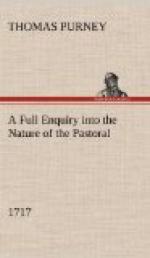SECT. Last.
Thus far proceeded Sophy, when Night drew on. He shut his Book; and Cubbin told him, he had not pass’d many days with so much Delight as that. If you have found my Discourse, said Sophy, entertaining, do not fail of being here again early to morrow Morning, and I will continue it to you. The Shepherd express’d his Satisfaction, and they hasted home together.
The following Morn was fair and inviting; they both appear’d when the Lark began his Mattin Song; and Sophy thus proceeded.
The End of the Second Part.
P A R T III.
CHAP. I.
Of the Sentiments in general.
I must crave leave to extend the Signification of the Word Sentiment, to the including tooth IMAGE and THOUGHT. For I think the Criticks should by all means have, before now, made that Division, and the omission has occasion’d the greatest Obscurity and Confusion in the Writings of those who have discours’d on any particular Kind of Sentiment. But that the Reader may take the more Care to keep this Distinction in his Head, we will give one Instance of the Confusion it occasion’d in the Mind of Longinus, who treated the Sublime, and certainly ought to have had a clear Notion of the Subject he wrote so largely, and so floridly upon.
Now in his sixth Section, he make’s it a Question, and discourses largely, whether Passion can go along with a Sublime SENTIMENT. But any one who has divided Sentiment into Image and Thought would laugh at this Question; it being so plain that passion is consistent with a Sublime Thought, and is not with a Sublime Image.
Would not any person who desired to acquire a true and thorough Notion of a sublime Sentiment, so as to know one, wherever met, be puzzled at Longinus’s telling him, Homer’s Sentiment is sublime, where he make’s the Giant’s heap Ossa on Olympus, and on Ossa Wood-top’d Pelion; and a little after telling him that Alexander’s to Parmeno is a sublime Sentiment. Parmeno say’s, Were I Alexander, I would embrace these Proposals of Peace. Alexander reply’d, And I, by the Gods, were I Parmeno. These Sentiments of Homer and Alexander (tho’ equally sublime) are as different as a Bright and a Tender Sentiment. If then I have settled one in my Mind, as sublime, How shall I conceive the other as such?
But there is no other way of avoiding this Confusion, and of being equally certain of all sublime Sentiments, but by knowing that the first of these is a sublime Image, and the last a sublime Thought or Sentiment. And you will find, if you consider the Nature of Homer’s Image, all sublime Images are like it; and the same of Alexander’s sublime Thought. Altho’ the sublime Sentiments in general are so different.
But since we are accidentally engag’d in considering the Sublime; I will endeavour to show you how to judge infallibly of a Sublime SENTIMENT. For I think it cannot be gotten from Longinus; or at least, I could never learn it from that most Florid and Ingenious author. And it may be shown in three Lines, as well as in so many Volumes.




